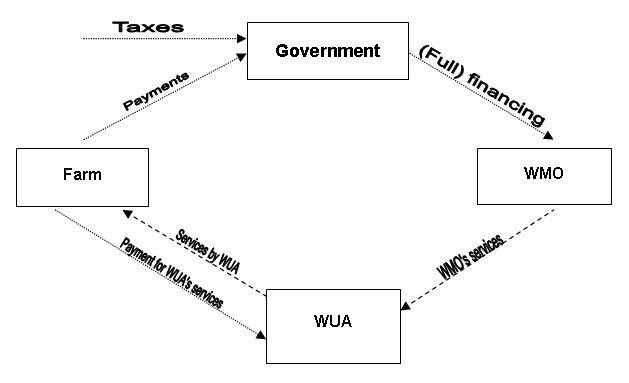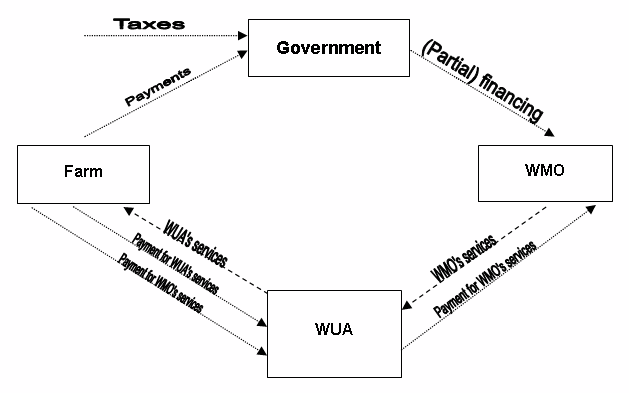
To the beginning of the section
The important factor of WMO’s sustainability is the financial independence of the organization and its ability to concentrate financial flows and distribute them to the benefit of the basin and its elements. The management system of WMO requires adequate financing so that the organization could fulfill its functions. This is one side of the problem related to the total size of financing WMO.
Another side of the financing problem relates to sources of financing. Most WMOs have limited autonomy and, to a larger degree, depend on central state budget. Those budget allocations vary from year to year, depending on government’s priority.
Uzbek WMOs virtually are fully financed from the state budget (Figure 1).

Figure 1. Scheme of financial flow under full financing from state budget
As is well-known from global and regional experiences, to reduce the financial load on the state and create good relationship between provider and user of irrigation services (by changing direction of financial flows) it is advisable to adopt water pricing, where water users pay (usually, partially) for irrigation services of water suppliers. Here, WMO’s budget is formed through state budget partially and irrigation fees (in Kyrgyzstan, Tajikistan and Kazakhstan) (Figure 2).

Figure 2. Scheme of financial flow under partial financing from state budget
The other side of WMO financing problem relates to areas of activity that are considered to be prior for financing.
1. Financing of institutional or nonproductive activity (the so called soft measures) that promotes things that were intended. Such activity is the essence of integrated approach to water management. This activity deals with managerial matters, including mechanisms:
• Reporting and transparency
• Policy making and planning
• Development of necessary laws
• Public participation
• Monitoring
• Collection of irrigation fees (not yet adopted in Uzbekistan)
• Data collection and analysis
• Research
• Capacity building
• Awareness raising
• Communication
2. Financing needed for routine tasks and for O&M of irrigation and drainage network, rehabilitation of river channel, prevention of weeding, sediment control, i.e. all that is needed for healthy environment in the control area of WMO.
Traditionally, priority is given to the second type of activity. Financing of soft measures is based on the left-over principle, although these measures are substantially cheaper as compared to structural measures.
Author: Mirzaev N.N., SIC ICWC